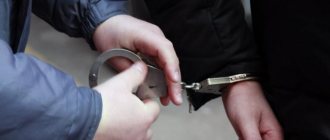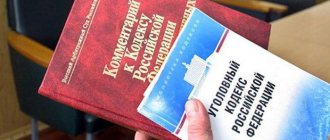What documents must law enforcement officers present to conduct a search?
A representative of law enforcement agencies must present an official identification document, a court order or an investigator (inquiry officer) order to carry out this action. Please note: if the person who carried out the search was not the one who made the decision, then he is obliged to provide an order to carry out the investigative action in question. Investigators (interrogators) are not required to provide copies of these documents to the person whose home is being searched, but you can politely ask them to photograph the papers.
World proposal
What else does Art. 182 Code of Criminal Procedure? The fact that before the search begins, the investigator must invite the citizen to independently hand over weapons and other things important for the investigation. For example, documents or valuables related to a criminal case.
If a citizen independently and voluntarily surrendered what was required of him, the search may not begin. The investigator decides at his own discretion whether to conduct it or not. After all, he has all the supporting documents. In principle, in practice, a search is still carried out if there remains a suspicion that a citizen staying in the home has hidden some evidence important to the criminal case.
Keep a few things in mind:
- The resolution must indicate the number of the criminal case within the framework of which the search is being conducted, as well as the exact address of the premises. It also contains the details of the person who compiled the document and his signature.
- Technical errors and clerical errors do not interfere with the search. But if the resolution indicates a different address, then it is prohibited to carry out investigative actions in your office or apartment.
Is it possible not to open the door to law enforcement officers who come to conduct a search of an apartment or office?
According to Part 6 of Article 182 of the Code of Criminal Procedure of the Russian Federation, if a citizen whose house is planned to be searched refuses to voluntarily open the door, law enforcement officers have every right to break it. In some cases, security forces cope with this task on their own, in others they call the Ministry of Emergency Situations. Therefore, there is no point in “holding the line,” especially since administrative liability is provided for this under Article 19.3 of the Code of Administrative Offenses of the Russian Federation.
However, sometimes citizens manage to negotiate with the investigator to allow 15-30 minutes to, for example, get dressed and call a lawyer. This is a fairly short period of time, so if you are at risk, then find a qualified defender and agree with him about everything in advance. Naturally, the arriving group will not wait for hours for the lawyer to arrive.
Unfortunately, in urgent cases, investigators may not give the citizen time. For example, this is possible if the search is carried out in criminal cases involving drugs (if you do not enter the premises immediately, the citizen may destroy traces of the crime).
Can operational officers search not only the premises, but also the persons in it?
Yes, this is possible: law enforcement officials can search any persons on the premises if they believe that they may have items related to a criminal case. Drawing up a separate protocol is not required. In this case, of course, the rules of a personal search must be observed (the person being searched and the person searching must be of the same sex, etc.).
In addition, there are no obstacles to searching handbags, briefcases, backpacks, etc.
Therefore, there is no point in hiding evidence on yourself or in bags: with a high degree of probability it will be discovered. An experienced investigator who has participated in hundreds of searches is well aware of the most typical hiding places of citizens.
Is it possible to film the search process on your phone?
The law does not prohibit filming the search process, however, most likely, a citizen’s mobile phone will be confiscated as an item that may be related to the crime committed. Meanwhile, operational employees themselves can take photos and videos of what is happening. If assists during the search , he can film the process on his devices - law enforcement officers do not have the right to seize them.
Can operational employees break into safes, cabinets, cabinets? Who will compensate for the damage?
First, law enforcement officers must invite the citizen to voluntarily open the lock. If the citizen does not want to do this, the lock is broken. If the operatives were unable to break the door using improvised means, they can take, for example, a safe to the department so that a specialist can open it.
A citizen may demand compensation for damage caused, but only in court and provided that the search was illegal. In addition, compensation for moral damage can also be demanded in court. a qualified lawyer can achieve compensation due to the great complexity of such cases, and also due to the fact that the courts secretly side with law enforcement officers.
Can a police officer walk into a nearby office if he thinks evidence might be hidden there?
No, since the search is carried out only at the address indicated in the decision on the conduct of this investigative action.
However, there are some nuances here; we will tell you more about this during your consultation.
What can they take away during a search (equipment, furniture, clothing, food, telephone)?
Law enforcement officers can take away absolutely any item that could presumably be related to the case under consideration. If it later turns out that the item was seized by mistake, it is returned to its owner.
Are you required to let you copy information when seizing computer equipment?
At the end of December 2022, a new article 164.1 appeared in the Code of Criminal Procedure of the Russian Federation, prohibiting the seizure of computer equipment if the crime under investigation was committed in the field of business activity. Instead of confiscation, law enforcement officers must copy the information onto their media. However, in some cases (for example, if there is a judicial act on the seizure of storage media), equipment can still be confiscated.
A citizen can petition the investigator to copy information onto their media, but whether such a request will be granted or not is a big question.
What is the best way to record violations during a search?
A citizen who believes that the process is being carried out with violations can make his comments in the search record, which is kept by the investigator (interrogator). Representatives of law enforcement agencies do not have the right to refuse this, but without the presence of a lawyer, as a rule, this cannot be done.
Is it possible to plead ill health and call a doctor to leave the search site? Could you have been detained at the search site?
A citizen whose premises are being searched, of course, can demand an ambulance be called if he feels unwell. If a doctor determines that a person needs hospitalization, law enforcement cannot forcibly detain the citizen. The search will continue with the participation of adult family members of the person being searched, representatives of the organization (if the event takes place in the company’s office).
Detention of the person whose home is being searched is also possible if there are grounds listed in Article 91 of the Code of Criminal Procedure of the Russian Federation (for example, traces of a crime were found in the home of the person being searched).
If the electronics are encrypted, can the police require a password, and what happens if the password is not given?
A citizen has the right not to give any comments regarding objects in an office or apartment. In particular, he may not disclose passwords. There is no liability for this.
What happens if a police officer sees a citizen destroying evidence (documents, storage media, drugs, crime weapons). Will this make a difference?
If a representative sees a citizen trying to destroy any objects during the search, he must prevent this. The actions of a citizen must be reflected in the protocol.
The mere fact of destruction of objects is not evidence of a citizen’s guilt in a crime; the search report is proof.
Can a police officer use force during a search?
Law enforcement officers have no right to use physical force unreasonably. But if the citizen whose home is being searched actively resists, a law enforcement representative may use physical force, use weapons or special equipment. Before using them, the employee warns the citizen of his intentions.
Is it possible to call a lawyer for a search?
The lawyer has the right to be present at the conduct of this investigative action, however, the investigator is also not obliged to postpone the search until the defense lawyer appears at the required address.
The best moment to call a lawyer is the time that the investigator gives the citizen to open the door voluntarily (as we indicated above - 15-30 minutes). If the defense lawyer manages to arrive before the search begins, the investigator is obliged to allow him to participate in the event; if he is late, it is quite possible that the lawyer will simply not be allowed to see the client.
If you have not found the answer to your question or want to get more detailed information, contact a lawyer.
Decisions and regulations
It is worth paying attention to other points prescribed in Art. 182 Code of Criminal Procedure. The procedure for conducting a search is something that will have to be studied in more detail. Violating the established rules is prohibited.
You have the right not to allow an investigator or other law enforcement officer to conduct a search without a special order or court decision. They serve as the documentary basis for starting the process. The following is important: the one who will conduct the search must show the tenant the supporting documents he has before starting it. As already mentioned, we are talking about either a court decision or a decision of the investigator. The absence of these papers makes it possible to prevent someone who was going to search the apartment from entering the home. You also have the right to refuse access to the property if a request to show you the relevant supporting documents is refused.
Package
The order of the process requires compliance with many nuances. The fact is that after the search, the seized objects, documents and valuables are shown to witnesses, as well as to everyone present in the room. If necessary, all this is packaged and sealed. To confirm the process, the signatures of those present during the search are affixed. Usually these are witnesses and apartment residents. According to Art. 182 of the Code of Criminal Procedure, judicial practice indicates that in almost 100% of cases it is necessary to pack and seal each piece of evidence or other seized item, sealing it all with the signatures of those present. This technique will help avoid accusations of forgery or changing the data/package of things. Therefore, the investigator is recommended to seal and pack all items that are not too large.
What can be seized during search activities?
Conducting an urgent search allows you to seize or get an idea of the location of the following objects:
- Values. Such items may leave traces of a crime. These may be items that were obtained through theft.
- Dangerous substances, weapons, drugs that should not be in the person being searched, and he does not have any documents for their storage.
- Documents that serve as evidence of the guilt of the person being searched.
- People who have been kidnapped, or hidden corpses.
Tolerance
The next important point specified in Art. 182 of the Code of Criminal Procedure is the procedure for gaining access to premises. The investigator has the right to search absolutely the entire apartment without exception. That is, he must be given access to all rooms. If the citizen refuses this, any door or lock can be opened at the discretion of the investigator. Only taking into account the absence of damage to property. In other words, the opening must occur without causing damage. Except for cases in which property damage is simply inevitable. Remember - no one has the right to just break into your house and sloppily open the premises and conduct a search. In practice, access to the entire apartment is usually completely provided to the investigator without any problems. Especially when you have nothing and no one to hide.
The mystery of the investigation
Art. 182 of the Code of Criminal Procedure “Procedure and grounds for conducting a search” indicates that the investigator is obliged to maintain the secrecy of the process. More precisely, his responsibilities include taking measures for this.
What is it about? That the investigator must take all measures to ensure the non-disclosure of the citizen’s personal information. That is, if details of private life or personal/family secrets “come to light”, they should not be made public. This can also include details of other people's private lives. By law, the investigator must do everything to keep the information received secret.
Usually the search takes place in front of witnesses. The investigator has the right to prohibit everyone present in the apartment from communicating with each other, as well as with other persons, until the process is completed. This is quite normal practice. She's completely legal. No violations are observed in this situation. After all, negotiations can distract from a search or somehow interfere with it.









